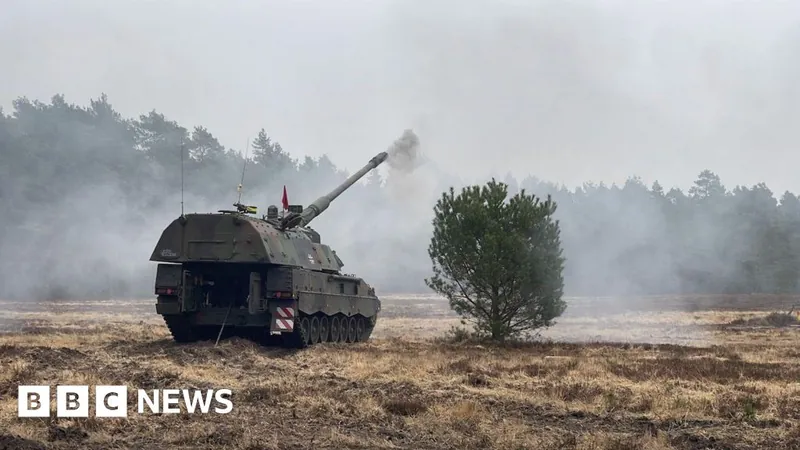
Germany's Bold Shift: Is the Nation Preparing for War?
2025-03-31
Author: Ting
Introduction
In a significant military turnaround, Germany is shedding its historical aversion to armed conflict as it ramps up defense investments, signaling a full-scale preparation for potential war against perceived threats, particularly from Russia. This shift comes on the heels of a recent parliamentary decision that freed the Bundeswehr from stringent debt restrictions, allowing for unprecedented military funding.
Military Enhancement and Budget Allocation
As missile launches vibrate across training grounds near Munster, locals have grown accustomed to the thunderous roars of military exercises. However, with a newly allocated €100 billion ($108 billion) for military enhancement, the sound of warfare is set to amplify even more dramatically.
General Breuer's Urgency
Germany's top general, Carsten Breuer, has made his stance clear: the urgency for this financial boost is immense, driven by the belief that threats from Russia could extend well beyond Ukraine. "We are threatened by Russia. We are threatened by Putin. We must do whatever is necessary to deter that," General Breuer stated emphatically. His chilling prediction warns of a possible attack within the next four years, a timeline that leaves little room for complacency in Germany's defense strategy.
Cultural Aversion to Militarism
Historically, Germany has wrestled with its militaristic past, where memories of instigating two world wars have fostered a cultural aversion to military escalation. For decades, many believed that Germany's commitment to pacifism and avoidance of conflict was the best way to seek redemption for historical atrocities. However, the situation has drastically changed since Russia's unprovoked aggression in Ukraine.
Chancellor Scholz's Zeitenwende
In February 2022, Chancellor Olaf Scholz announced a national pivot, or "Zeitenwende," directing a monumental sum toward strengthening the country’s military capabilities. Yet, as General Breuer pointedly notes, the efforts have merely scratched the surface, filling potholes rather than establishing a robust military framework. The Bundeswehr is now deemed woefully inadequately staffed and equipped—a strategy shift that many believe is neither fast nor thorough enough to meet the looming threat from the east.
Public Perception of Threats
The recent climate of insecurity has not gone unnoticed by ordinary Germans. Polls show that a staggering 79% view Putin as a serious danger to peace in Europe. This perception is compounded by the shifting political landscape in the United States, where trust in American security assurances seems to be waning.
Changing Views Among the Youth
Young Germans, like 18-year-old Charlotte Kreft, are beginning to reconsider their views on militarization. Once strictly pacifists, a new generation realizes that defending democratic values and freedoms may require rethinking their stance on armed forces. "We need to adapt to the current challenges," she said, echoing a sentiment felt across many demographics.
Need for Increased Troop Numbers
General Breuer's projections require a drastic increase in troop numbers to bolster Germany's military presence adequately. He estimates that an additional 100,000 soldiers will be needed to counter threats effectively, underlining the necessity for a re-examination of conscription policies. Although such proposals are in their infancy, the discourse surrounding Germany's military stance is increasingly gaining traction.
Conclusion
In stark contrast to its traditional stance, this shift indicates that Germany is ready to embrace its military responsibilities. General Breuer frequently engages the public with a piercing question: "Are you ready for war?" It’s a sobering reminder that, alongside historical caution, the modern world insists on vigilance and preparation.
As Europe braces itself for an uncertain future, Germany’s radical military pivot could reshape the continent’s security dynamics. The historic decisions being made today are not only about defense but also signify a broader acceptance of a role that Germany long shied away from. The time for adaptation is now, and the echoes of history may no longer define the path forward.




 Brasil (PT)
Brasil (PT)
 Canada (EN)
Canada (EN)
 Chile (ES)
Chile (ES)
 Česko (CS)
Česko (CS)
 대한민국 (KO)
대한민국 (KO)
 España (ES)
España (ES)
 France (FR)
France (FR)
 Hong Kong (EN)
Hong Kong (EN)
 Italia (IT)
Italia (IT)
 日本 (JA)
日本 (JA)
 Magyarország (HU)
Magyarország (HU)
 Norge (NO)
Norge (NO)
 Polska (PL)
Polska (PL)
 Schweiz (DE)
Schweiz (DE)
 Singapore (EN)
Singapore (EN)
 Sverige (SV)
Sverige (SV)
 Suomi (FI)
Suomi (FI)
 Türkiye (TR)
Türkiye (TR)
 الإمارات العربية المتحدة (AR)
الإمارات العربية المتحدة (AR)